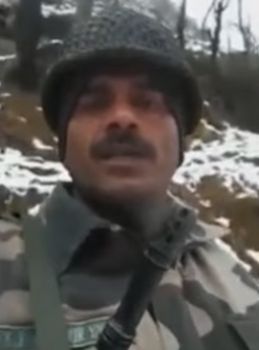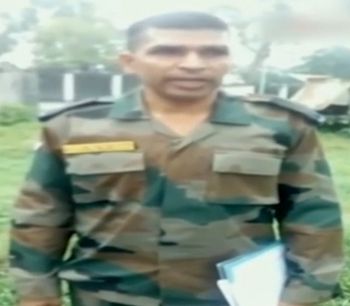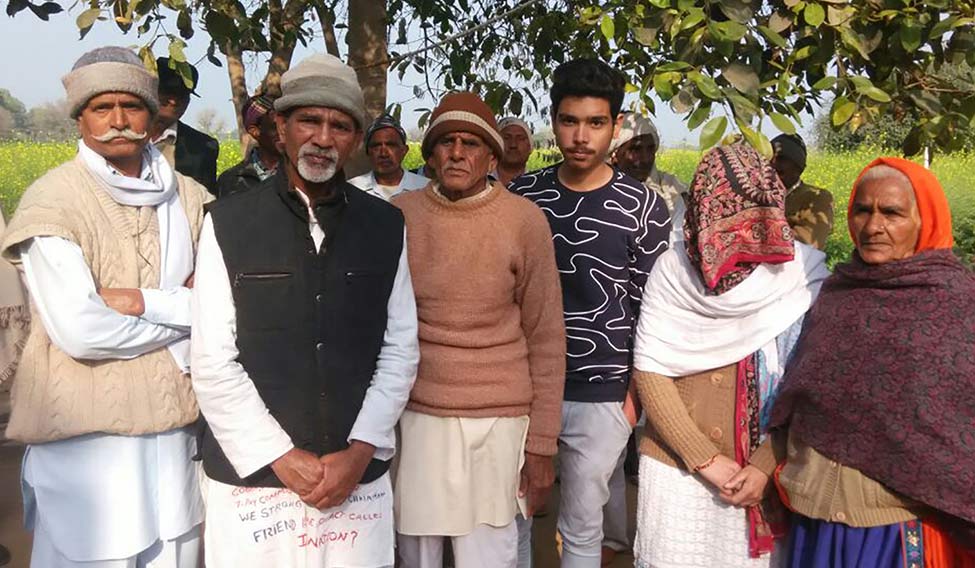When Prime Minister Narendra Modi launched the Sandesh to Soldiers campaign through his mobile app, MyGov.in website and public broadcasters around the time of Diwali, his intention was to increase the interaction between the people and the armed forces. He wanted to focus on the ‘human element’ of the valiant soldier, and hear his grievances and boost his morale.
Two months later, however, it seems to have produced some undesired results, as jawans of the Army and the central paramilitary forces started using social media to lay bare their grievances. First, Border Security Force constable Tej Bahadur Yadav shared a video on social media, complaining about the watery dal and burnt rotis he was being served in the freezing forward posts in Jammu and Kashmir. After a few days, a Central Reserve Police Force jawan came out with a video complaining about pay discrimination and lack of facilities. Then Lance Naik Yagya Pratap Singh of the 14 Rajput Regiment uploaded a video about the menial duties the sahayaks (orderlies) have to perform in the Army.
Inquiries are on in all three cases—not just on the complaints, but also against the soldiers for breach of discipline and misuse of social media. Singh is reportedly on a hunger strike since January 14, and has been moved to Bareilly Military Hospital. Army's press release said he was “showing aggressive behaviour”. “The individual has spoken to his wife on mobile, which he is free to use and is currently at Bareilly Military Hospital. Army authorities have made arrangements for his wife's stay and interaction with her husband,” said Col Rohan Anand, public relations officer of the Army.
 Tej Bahadur Yadav
Tej Bahadur Yadav
Families of these soldiers are worried about them. In fact, the best they hope for is a graceful exit from the forces. Yadav's wife, Sharmila, said she had not spoken to him for long. “Earlier, when he did not call, we were not worried; but now we are scared. I have a teenager son and aged in-laws to take care of. I will be happy if he is sent home gracefully and given retirement. But he should get his pension; he has spent 20 years in the force.”
One of Yadav's brothers is in the BSF and he has a nephew in the Army. And, the people of his village have not taken kindly to the action against him. Members of 51 village panchayats gathered in his house a week ago, expressing solidarity with the family. They are planning to block the national highway passing through Jhajjar and Revari if he does not get justice and return home honourably. “Yadav and the other jawans have not committed treason. Why should they be penalised? They have only highlighted issues that are known to all,” said Ranbir Singh, general secretary of the Confederation of Ex-paramilitary Forces Welfare Association.
The government clearly messed it up. Lt Gen Raj Kadyan, former deputy chief of Army Staff, said the matter was blown out of proportion because the government overreacted. “When Yadav's video came out, there was no need for the home minister to intervene. Then the PMO stepped in. Ideally, the BSF should have been asked to sort out the issue and give a report. But the BSF also faltered in its initial response by trying to blame the jawan, calling him undisciplined. The responses were ill-timed,” he said.
In fact, Kadyan sees the political leadership's incapability as the root of all problems in the forces. “They are put in a prolonged situation where the problem is political in nature and cannot be solved by them. Be it Jammu and Kashmir, Manipur or Assam, merely deploying the forces and keeping them there for prolonged periods will not solve any problem,” he said.
Officials in the home ministry admitted that issues of the armed forces should be handled more sensitively. Former CRPF chief Dilip Trivedi, who set up a mechanism to provide warm food at railway stations for jawans travelling on election duty, said constant innovation and quick grievance redress were the only way forward. For now, the home ministry has promised to rope in experts from the Defence Research and Development Organisation to make food palatable in high-altitude weather and to improve food quality. The ministry has also proposed to set up a mobile app for jawans to air their grievances.
 Lance Naik Yagya Pratap Singh
Lance Naik Yagya Pratap Singh
But the Army wants to sort out the problem the traditional way. On January 15, when families of armed forces personnel were felicitated on Army Day, Chief of Army Staff General Bipin Rawat warned of strict action against soldiers who used social media to air their grievances instead of going through the regular channels. In an institution that swears by its discipline, grievances being aired publicly is seen as an attempt to undermine institutional mechanisms. However, at a time when jawans move around with smartphones, it was inevitable.
“There is no ban on use of social media but no one can bypass the chain of command,” said Maj Gen Ajay Das, additional director-general of public information at Army Headquarters. “In the Army, the grievance redress mechanisms are very fast and people are empowered down below to address any issue that crops up.”
Lance Naik Singh touched a raw nerve when he complained about the sahayak system in the Army. The Army prides itself on the 'buddy' system which is essentially a colonial era practice where trained jawans serve as helpers to officers. Singh complained of wrongdoing by his superiors who made him carry out humiliating domestic chores.
The Air Force and the Navy have already done away with the sahayak system. But Kadyan said the Army could not do so because it allowed officers to focus on work, especially when they were suddenly mobilised. “We must understand that it is a voluntary post,” he said. “He is a comrade-in-arms who also assists the officer in mundane duties. What the government can do is to do away with the practice in static postings.”








